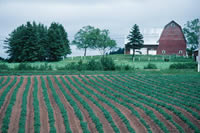|
Most people don't know Norman Bourlag. No, he's not the guy who played the cynical Mr. Roper on "Three's Company," and he's not the guy with the stuffed mother in "Psycho." He's the guy who is widely recognized as the father of the "Green Revolution"—the system of farming that combined hybrid seeds with chemical pesticides and fertilizers to grant the world significantly increased crop yields, especially yields of "cereal crops" like wheat, corn, and soybeans.

Mr. Bourlag has been heard recently chiding "extreme greenies" for promoting organic, sustainable agriculture, saying that such a move either would require the conversion of millions more acres of meadow and forest land into farm land or would mean mass starvation due to what he claims are lower yields from organic farms. With all due respect, we think Stormin' Norman B. is out in left field playing scarecrow, spouting off about nothing more than the Green Revolution Myth.
First, there is an obvious question about the logic of Bourlag's assertion that the increased yield from Green Revolution farming arrived just in time to save hundreds of millions, maybe billions, of earth's swelling human masses from starvation in the 20th century. One could just as easily frame the issue the other way around: Might it have been the suddenly increased availability of cheap food that itself allowed the global population to rise so quickly? Remember the old saying about "tasks expand to fill the amount of time allowed them"? A version of that may apply here.
Another way to look at the question is whether the Green Revolution has been successful at eliminating hunger. It hasn't. Since the Green Revolution kicked into high gear in the 1960s, there has been only a modest reduction in the number of people starving or chronically hungry. In 1970, there were an estimated 942 hundred million people in that category; in 2002, the United Nations reported that the number is currently 842 million.
 This modest reduction has been almost entirely due to lower levels of hunger among the Chinese population, with the number of hungry people increasing in most other areas of the world.
This modest reduction has been almost entirely due to lower levels of hunger among the Chinese population, with the number of hungry people increasing in most other areas of the world.
It is true, of course, that a few billion more people ARE being fed today compared to half a century ago. But it's far too simplistic to say the Green Revolution has been a success. The Green Revolution's use of hybrid seeds, irrigation, chemical fertilizers and pesticides, fossil fuels, farm machinery, and high-tech growing and processing systems combined to greatly increase yields. But this course of farming history cannot be sustained in the face of declining availability of fresh water, the peaking of natural gas and oil supplies, soil degradation, and pollution.
So, the Green Revolution did help increase total food output, but the news is not all good. The technologies of the green revolution should be looked at as the plant equivalent of steroid use in human athletes. A jock that uses steroids will gain muscle and strength faster and have a competitive advantage.
 But the big boost is not sustainable over a long period of time, and the negative side effects are well known and often catastrophic to the athlete.
But the big boost is not sustainable over a long period of time, and the negative side effects are well known and often catastrophic to the athlete.
In the case of Green Revolution farming, the chemicals used pollute our land, air, and water; the switch from heavily rotated multiple crops to mono-cropping or dual-cropping reduces total soil fertility and the nutritional value of our food; and the lower number of seed varieties used reduces the genetic diversity found in crops, thus endangering the stability of farm output in the future. The side effects related to soil fertility and genetic diversity will ultimately take their toll. Indeed, yield increases in today's farm fields have generally leveled off and, in cases such as rice and wheat, yields are beginning to decline in some areas.
Let's be a little more specific about the problems associated with Green Revolution farming:
- Farmers, farm workers, and all of us are continually exposed to chemical pesticides due to their widespread use, with each of us carrying a body burden of the toxins.
- Countless numbers of streams, rivers, and drinking water sources are degraded due to pesticide and fertilizer runoff.
- Major portions of bays and gulfs are oxygen-starved coastal dead zones due to algal blooms that are fed by fertilizer runoff.
- Wildlife suffer from genetic mutations due to the farming chemicals that contaminate their ponds and swamps. Notable examples: Genetic mutations in frogs and abnormal genitalia in alligators.
- State advisories for locally caught fish are chock-full of warnings about fish species contaminated with pesticides.
Now to the real point—would we starve if we transitioned back to sustainable agriculture and abandoned the chemicals we've come to accept as a normal part of farming? No, not at all. Multiple studies, including work by the US National Research Council and a 23-year study by the Rodale Institute, found total food output from "alternative" farms to be equivalent to Green Revolution farms—and sometimes higher.
Cuba provides a real-life, working model to test the conclusions of such research. When the US trade embargo was imposed on Cuba in the late 1980s, the country's access to Green Revolution "inputs" was suddenly severely restricted. Cuba began to reorient its agriculture back to sustainable approaches based on traditional farming practices and smaller farming operations. Within a decade, the country had solved its food problem, with the added benefit of freeing itself from the cost and toxic pollution associated with imported farming chemicals.
As Lt. Columbo was fond of saying, just one last thing... The big agribusiness companies that brought you the hollow promises of the chemical-based Green Revolution 1 are now busy cooking up the genetically engineered (GE) Green Revolution 2. Again they promise to save the world from hunger, but as before, their real goal is to reap bountiful profits. Not only do some GE technologies such as "herbicide tolerance" not increase yield and farmer profits, they have been documented to have the opposite effect. In such cases, the only people benefitting are the GE seed and pesticide companies and their shareholders.
There is a place for research and technology in farming, but we should stop trying to conquer nature's complex, inexorable forces and instead should focus on approaches that work WITH the power of nature. A lot of research dollars went into developing Green Revolution and GE technologies. If instead we had invested in better sustainable-agriculture methods, we
 would have increased yields, retained healthier farming practices, and greatly lessened the huge loss of small and medium-sized farms. In fact, demonstration projects have shown that increases in total food output of up to 100% are possible by using advanced sustainable agriculture techniques. Such approaches also reduce costs and avoid the chemical pollutants and potentially dangerous GE strains that are now upon us.
would have increased yields, retained healthier farming practices, and greatly lessened the huge loss of small and medium-sized farms. In fact, demonstration projects have shown that increases in total food output of up to 100% are possible by using advanced sustainable agriculture techniques. Such approaches also reduce costs and avoid the chemical pollutants and potentially dangerous GE strains that are now upon us.
We won't be able to simply flip a switch and suddenly convert all the farming acreage on the planet back to smaller, more sustainable farms overnight. But it CAN be done gradually, without causing mass starvation. Indeed, better health for more people would be the overall result. We in the developed countries of the world should ask our elected representatives to begin a major shift in farm policy to foster such change. We can also directly support the effort by eating organic and/or locally grown food.
The solution to global hunger is to solve problems related to democracy and distribution of income and food in the Third World. We should also ensure that the right to be self-sufficient when it comes to producing one's food is not trumped by free-trade agreements. The solution to world hunger is NOT to develop expensive, unneeded technologies that endanger the entire food system. Just say 'no' ... to G-M-O ... and the Green Revolution.
More reading:
More articles and resources on....
Get Grinning Planet free via email
|


